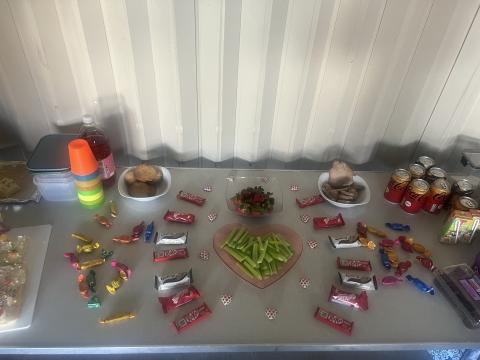
We’ve been supporting a range of organisations in Bexley that provide vital services to local people. Many of these groups are led by inspirational women who balance parenting, education, and work, volunteering their time to manage community groups that support Bexley residents.
8th March was International Women's Day and this year’s theme, #AccelerateAction highlighted the swift actions necessary to achieve gender parity.
According to data from the World Economic Forum, at the current rate of progress, full gender parity won’t be achieved until 2158.
To mark International Women’s Day, we spoke with three women who lead local groups and projects that empower women and support Bexley residents.
One of these women is Shantel Morris, Founder of Morris Mission, an organisation that provides workshops for people facing eviction and living in temporary accommodation.
Shantel reflected on her experience launching a new charity as a single parent, “Balancing it all has been quite challenging, but I've made the time because I saw the opportunities that were given to me.
And I said I couldn't miss the opportunities that were given to me at this time when I know these families need help.”
Shantel (above), Founder of Morris Mission
Shantel’s workshops provide essential tools and resources to help people living in precarious housing situations. Drawing from her own lived experience living in temporary accommodation to educate others on how best to find permanent housing.
Speaking to Tania, we learned how pickleball has transformed access to sports within the Deaf community,
“They’re playing it up and down the country. In January, we hosted the first-ever Pickleball Festival in Sidcup. Fifty people came to that, and we got publicity.”
Bexley Deaf Pickleball team
Tania is the CEO of Bexley Deaf Centre, a Pickleball champion and a footballer, who plays for Charlton Athletic, the England national team and walking football,
“When we travelled together with England, it's so much fun. You’ve got a stressful job and you're a mum, or you've got a family. And then to go away and play football and just be you - this is it's really important”.
Tania spoke about the lower standards for women in walking football,
“If we do play in tournaments, they are organised by men.
“They’ll organise all the men's things first, and then women are an afterthought, and we've ended up with the worst pitch, the worst referee and you're like, hold on a minute - how is this right?”
We also met Rudo Mutiba who told us how her group, Women’s Lounge empowers women:
“[By] teaching them resilience. We offer services that empower them in healthcare, education. They learn skills like knitting and cooking…”
Rudo, Trustee of Women’s Lounge
Rudo is a Trustee of Women’s Lounge, a women-led initiative that provides networking opportunities for predominantly Black and Minority Ethnic women in Thamesmead.
The group offers a range of services to women, including nutritional and educational programmes, as well as culturally enriching social activities.
This enables attendees to enjoy experiences that are usually inaccessible to people from marginalised communities:
“We [primarily] support people from poorer socioeconomic backgrounds. One of the main challenges is they don't have access to [certain] opportunities or the finances.
So that's where we come in, because some of them have no idea where to even start.”
Food spread at Women’s Lounge International Women’s Day event
Rudo pointed out that members of her group might not be aware of services that are available:
“Sometimes, you find that they cannot access certain services, or they've got no idea that they exist. Because it's not been put out there in the communities.“
Rudo with Daisy Tayedzerwa , the Founder of Women’s Lounge
Women’s Lounge have been instrumental in finding opportunities for women in Thamesmead:
“Last year, we managed to get about ten women into higher education because we had a connection with someone from higher education who came and interviewed some of the ladies.”
“About five of them went into social and healthcare, which is quite important.”
She continues, “Some of them didn't know, or had no idea that they were eligible for finance.”
Both Rudo and Shantel pointed out how knowledge and education are fundamental in empowering women and girls. Shantel emphasised the importance of women, “having the tools to be able to stand up for themselves, speak their truth, be seen and heard.”
Tania highlighted how football provides a safe space for women and girls,
“You can talk about periods, and even getting the colour of women's shorts changed because a lot of the teams were playing in white shorts.”
Tania (centre) and the England Women’s Football team
“Now, the women don't play in white shorts anymore. So that's something that's been worked on as a collective. We've all gone to the powers that be and stated, ‘This won't work for us’.”
Tania (above) in action
In response to this year’s theme of #AccelerateAction, our interviewees acknowledged that it’s systemic change that is needed to facilitate gender equity.
Shantel said:
“There definitely is discrimination, and I feel that with knowledge and educational support that there will be more equality for women.
But unfortunately, women have not been able to stand up and say how they feel.”
Rudo echoed Shantel’s sentiments about gender inequality:
“We need more financial support from governments and organisations, and more awareness about the challenges that women face.
Even in the workplace, it's embarrassing to talk about it in 2025, but we still have issues where our male counterparts are getting paid more.
And we think we've moved on, but it shouldn't be happening now, because they're doing the same job, they've gone through the same stress, have the same degrees, and everything. So we need systemic change.”
The quotes in this article have been edited for this publication.
Visit the Bexley Deaf Centre, Morris Mission, and Women’s Lounge websites for more information.